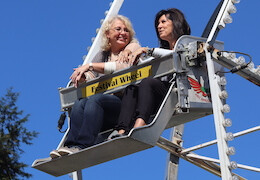"We live by encouragement,” said actress Celeste Holm, “and we die without it – slowly, sadly, angrily.”
Every person you meet needs encouragement. It’s part of what it means to be human. All of us need a boost from time to time, and nobody lives constantly on the mountaintop. We need each other for regular upliftings.
Most of us recognize this responsibility, and have a desire to encourage others, but often our attempts misfire. Perhaps this is because personalities differ, and what encourages one person may not encourage another.
Authors such as Joyce Littauer, Gary Smalley and Tim LaHaye, have identified four basic temperament types:
- Sanguine – “Let’s have fun.”
- Melancholy – “Let’s go deep.”
- Choleric – “Let’s get moving.”
- Phlegmatic – “Let’s get along.”
Personally, as a sanguine, I’m inspired by inspiration. Just give me an uplifting quote or idea, and that will pump me up. Positive thoughts help me combat a sagging spirit. I peruse books and other resources regularly, looking for a good, positive, inspiring thoughts to brighten my day. It helps me keep on the sunny side. Sometimes, I mistakenly believe everybody else will be uplifted by the same things that encourage me, but I am learning that different personalities require other types of encouragement.
When a melancholy shares a burden, the last thing they need is an "inspirational thought" or trite pep talk. “No worries! Everything’s going to be just fine! You’ve just gotta believe!” Those responses are unhelpful. Instead, the way to encourage melancholics is to understand them. They need a caring friend who will truly listen, empathize, and comprehend the depth of the situation. Their encouragement comes from not feeling alone.
The best way to encourage a choleric, on the other hand, is to do something! They become discouraged and frustrated when people sit around flapping their jaws without taking action. Hashing in circles is the way to drive a choleric bonkers. They interpret inaction as apathy and encouraging them means getting things done.
Finally, phlegmatics are encouraged by peace. They are disheartened by quarreling, arguing and negative nitpicking. Gary Smalley compares them to the golden retriever: loyal and easy going. For them, encouragement comes when people work together harmoniously for the common good.
This brings me to three important points:
- If you only use your natural encouragement style, you will miss the bullseye with 75% of your friends. Nobody connects naturally with everybody. It takes effort to understand.
- If your effort to encourage someone backfires, pause and ask if it might just be a personality collision. You may need to make adjustments.
- The best way to encourage others is to speak it in their language. The more deeply you know a person, the more likely you will know what they need. This requires listening, careful attention, and a willingness to step beyond ourselves. It helps to remember this encouragement is for them and not for you.
Originally posted to Rev. Wilson's blog, Revitalize Your Church on May 19, 2020.







